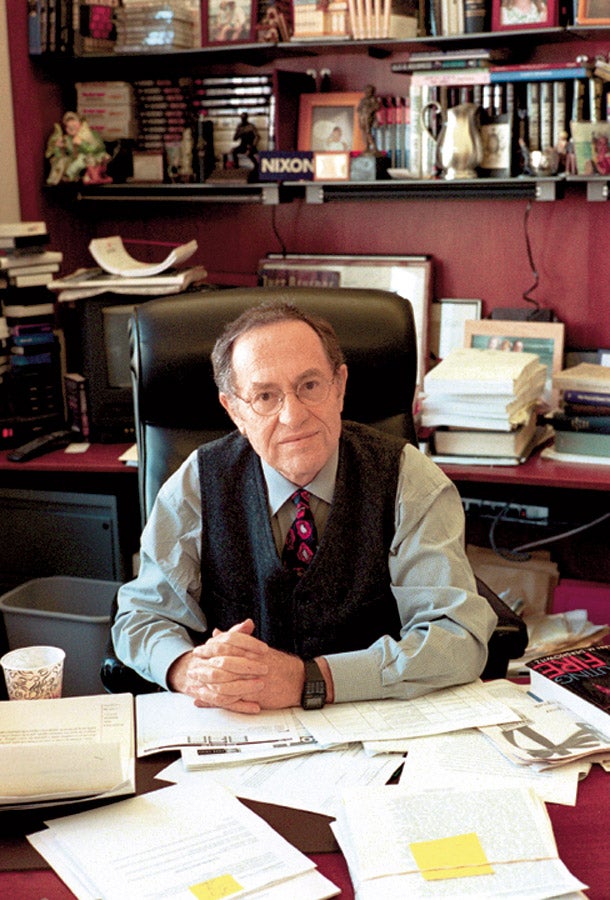The following op-ed, “Indictments are not the best revenge,” written by Professor Alan Dershowitz was published in the September 12, 2008, edition of the Wall Street Journal.
I don’t agree with a lot of the Bush administration’s policies in the war on terror, and I plan to vote for Barack Obama and Joe Biden in November. But during a recent campaign rally Mr. Biden gave a wrong-headed, if well-intentioned, answer when asked whether he would “pursue the violations that have been made against our Constitution by the present administration?” This is how he responded: “We will not be stopped from pursuing any criminal offense that’s occurred.”
After praising Democratically controlled congressional committees for investigating these matters — “collecting data, subpoenaing records . . . building a file” — Mr. Biden continued: “If there has been a basis upon which you can pursue someone for a criminal violation, they will be pursued — not out of vengeance, not out of retribution, [but] out of the need to preserve the notion that no one, no attorney general, no president — no one is above the law.”
Mr. Biden’s comments echoed what Mr. Obama had said in April when he pledged that, if elected, he would have his attorney general investigate the actions of his predecessor to distinguish between possible “genuine crimes” and “really bad policies.” Mr. Obama moderated his statement by stating that he would not want his first term “consumed by what was perceived on the part of Republicans as a partisan witch hunt,” because his administration would have many other problems “we’ve got to solve.”
No reasonable person can disagree with the important principle underlying these statements by the democratic nominees that “no one is above the law.” But there is a countervailing principle at play here that is equally important — namely that the results of an election should not determine who is to be prosecuted. These principles inevitably clash when the winners of a presidential election investigate and prosecute the losers, even if the winners honestly believe that the losers committed “genuine crimes” rather than having pursued merely “bad policies.”
Under our particular system of government, it is nearly impossible for a winning administration to prosecute those it defeated without it being perceived, quite understandably, as “a partisan witch hunt.” This is because the attorney general of the United States, the official who a President Obama would ask to review his predecessors’ actions, plays two roles simultaneously — that of political adviser to the president, and that of chief law enforcement officer of the United States.
In many other countries, these conflicting roles are performed by different officials. For example, in England, the minister of justice is a political adviser to the prime minister, but he plays no role in investigating and prosecuting crimes. That sensitive job is left to the director of public prosecution, who is nonpartisan. The same is true in Israel, where the minister of justice is a political adviser to the prime minister and the attorney general is the nonpartisan chief law enforcement official. (The attorney general of Israel will soon decide whether to prosecute Prime Minister Ehud Olmert on alleged corruption charges.)
It is because our system allocates these two incompatible roles to a single public official — the attorney general — that we have, in the past, seen the need to appoint “independent counsel” or “special prosecutors” to investigate political crimes. In England, Israel and other nations that divide these responsibilities, there is no need for these troublesome contrivances, because the normal prosecutors are already “independent” of partisan pressures.
We simply cannot trust a politically appointed and partisan attorney general of either party to investigate his political predecessors in a manner that is both fair in fact and in appearance. Nor would the appointment of “independent” or “special” counsel solve the structural problems inherent in our system. These ersatz functionaries bring problems of their own to the criminal justice process, as evidenced by the questionable investigations that targeted President Bill Clinton, vice presidential chief-of-staff Lewis “Scooter” Libby (full disclosure: I consulted with both of them, without fee, about their cases) and others over the past decades.
Continue reading “Indictments are not the best revenge.”
Mr. Dershowitz, a professor of law at Harvard, is the author, most recently, of “The Case Against Israel’s Enemies: Exposing Jimmy Carter and Others Who Stand in the Way of Peace” out this month by Wiley.
